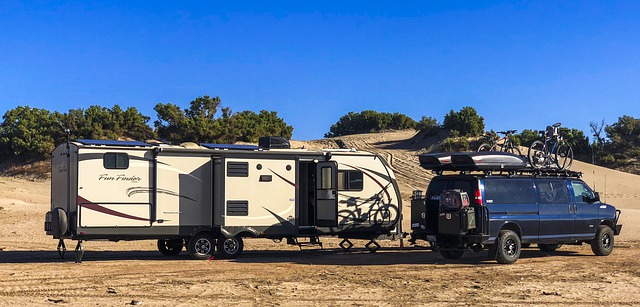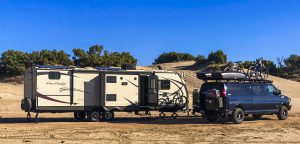

If you own a car, chances are you know a little about its battery – where it is, what it does, what to do when it runs down. But do you know about RV batteries?
Your RV has two different kinds of batteries. Your starter, or chassis, battery starts the engine to actually move the vehicle when you’re traveling. Your deep cycle, or house, batteries run everything in the RV when you’re camping and not relying on shore power. Because of their very different functions, the batteries work differently. Starter batteries provide a quick burst of energy to start the vehicle, while house batteries are designed to provide slow, steady energy over long periods of time. If you take good care of your house batteries, they should last you around ten years. Here’s what you need to know about selecting the best RV battery.
What does deep cycling mean?
RV house batteries deep cycle, which means they’re fully discharged before they are recharged again. They should last up to four times longer than normal starting batteries. Because they provide slow, steady power, they last up to four times as long as a starter battery.
Different kinds of RV house batteries
There are two basic kinds of RV batteries – flooded lead acid and valve regulated lead acid batteries. The most common of the two are the flooded lead acid, where the lead is bathed in a solution of water and acid. The batteries lose some of this acid each time they’re used, so you’ll have to refill them with water every so often.
Valve regulated lead acid batteries require almost no maintenance – the electrolyte is suspended in a gel or fiberglass mat. Gel cell batteries use battery acid in the form of a gel. They’re leakproof and used often in boats and water vehicles, though some reviews say they don’t recharge as well.
Measuring the power of house RV batteries
Power for deep cell batteries is measured in either amp-hours (Ah) or reserve capacity (RC). Ah refers to how many amps the battery will put out over 20 hours, and RC refers to how many minutes the battery can support a 20 amp output. The higher your Ah or RC rating, the more power your battery has.
Caring for your RV battery
To make sure you get the most use out of your house batteries, make sure to cycle the battery down to 50% discharge before recharging, instead of waiting until it’s down to 20%. In general, the sooner you can recharge your battery, the better.
You also want to be careful of undercharging the battery. Make sure it charges to the full 100% before unplugging and using it. Undercharging can age your battery and cause sulfation, where sulfate material crystalizes on the discharged portions of the battery plates, making them useless.
When disconnecting the battery, remove the negative charge first. When reconnecting it again, connect the positive terminal first. Also, keep in mind that battery capacity is reduced in extreme cold and increased in extreme heat. A partially-discharged battery can also freeze, but a fully charged battery cannot. If you can, keep your battery charged all winter, or disconnect and store it in a warmer place until you’re ready to use your RV. Also, keeping your battery inactive too long will cause it to lose its charge and it won’t work for you.
To clean batteries, dissolve one teaspoon of baking soda in one cup of water and spray it on the battery. The build-up will bubble away, then spray off any residue.
The best batteries for RV
Here are some of the best RV batteries, based on RV battery reviews.
- The XS Power Deep Cycle Battery
- The Stinger Deep Cycle Battery
- The Universal Sealed AGM Battery
- The Optima Yellowtop Battery
With a little research, you can be sure of finding the best RV battery for your rig!
This post may contain affiliate links.
